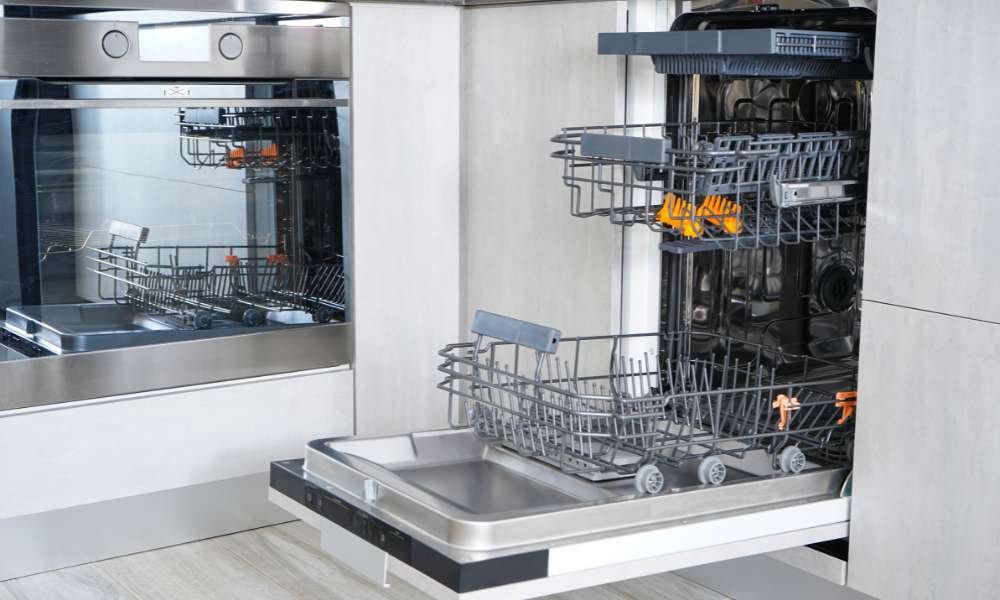You in all likelihood awareness on functions like wash cycles, strength efficiency, and noise ranges. But one issue that often gets overlooked is the actual weight of the equipment. Whether you are making plans to put in it yourself, want to move it upstairs, or in reality want to make certain your kitchen setup can handle it, knowing the average weight of a dishwasher can make a massive difference.
Dishwashers come in all styles and sizes—from compact countertop fashions to full-sized built-ins or even industrial-strength business machines. Each type varies in weight depending on its length, substances, and internal additives. In this manual, we’ll discover the average weight of dishwashers across differing types, why weight subjects greater than you would possibly suppose, and the way to select the proper model for your house. Whether you’re upgrading your kitchen or shopping for your first dishwasher, this facts will help you’re making a better, smoother choice.
What Is the Average Weight of a Dishwasher?
When shopping for a dishwasher, one often neglected but vital element is its weight. On average, a preferred integrated dishwasher weighs among 50 to 75 kilos (22 to 34 kilograms). However, this range can range significantly based on the sort, size, and internal components. Understanding the average weight of a dishwasher assist you to make a more knowledgeable choice, in particular in case you’re putting in it yourself or have space and flooring considerations for your kitchen.
Why Dishwasher Weight Matters More Than You Think
While weight might not be the first thing that comes to mind when choosing a dishwasher, it can actually impact several key areas—from installation and portability to structural support and energy use. Heavier dishwashers may be more stable and better insulated, which can help reduce noise. On the other hand, lightweight models are easier to move and ideal for small spaces or renters who may need a more flexible solution.
Breaking Down the Numbers: Compact vs. Standard Dishwashers
Compact dishwashers are typically narrower and designed for smaller kitchens or apartments. They usually weigh around 40 to 55 pounds (18 to 25 kg). Standard dishwashers, which are more common in family homes, weigh about 60 to 75 pounds (27 to 34 kg). The difference in weight comes from the size of the tub, the materials used, and the features included. If space-saving is a priority, a compact unit may be the way to go, but it often comes with a slight trade-off in capacity.
Built-In Dishwashers: Average Weight and What to Expect
Built-in dishwashers are permanently installed under kitchen counters, making them the most common type. These typically weigh between 60 and 75 pounds. Their heavier weight is due in part to durable construction materials, such as stainless steel tubs and advanced sound insulation. Because of their size and features, built-in models usually require professional installation, and understanding their weight can help you prepare for delivery and setup.
Portable Dishwashers: Are They Lighter Than Built-Ins?
Portable dishwashers are designed to be moved and stored when not in use, which means they tend to be lighter than built-in models. Most portable units weigh around 50 to 65 pounds (22 to 29 kg). Their mobility makes them a great option for renters or small households that can’t commit to a built-in installation. Despite being lighter, many portable dishwashers still offer similar cleaning power and convenience.
Countertop Dishwashers: Small but Surprisingly Sturdy
If you’re limited on space, a countertop dishwasher might be the perfect fit. These compact units usually weigh between 30 and 45 pounds (14 to 20 kg). Though small, they can still handle a respectable load of dishes and are perfect for single users or small families. Their lightweight design makes them easy to place on most counters and move as needed, though their solid construction still gives them a sense of durability.
Commercial Dishwashers: The Heavyweights of the Kitchen
Commercial dishwashers, used in restaurants and large-scale kitchens, are significantly heavier due to their size and industrial-grade components. These machines can weigh anywhere from 100 to over 200 pounds (45 to 90 kg), depending on the model and features. They are built for speed, efficiency, and large volumes, which naturally requires a more robust build. These dishwashers are not suitable for most residential kitchens due to their size and installation requirements.
Top Factors That Affect the Weight of a Dishwasher
Several factors influence how much a dishwasher weighs. Material is a big one—stainless steel tubs are heavier and more durable than plastic ones. Size also plays a role: larger dishwashers weigh more simply because they hold more components and water. Additional features like insulation for noise reduction, drying fans, and specialized wash cycles can also add weight. Even the brand and model design can make a difference, so it’s worth comparing specifications before you buy.
Types of Dishwashers
Dishwashers come in various types, each with its own design, functionality, and—importantly—weight. From space-saving models to heavy-duty commercial machines, understanding the average weight of different dishwasher types can help you choose one that fits your space, lifestyle, and installation capabilities. Whether you live in a small apartment or manage a busy commercial kitchen, there’s a dishwasher out there suited to your needs.
Built-In
Built-in dishwashers are the most common residential type and are permanently installed under the kitchen counter. These models typically weigh between 60 to 75 pounds (27 to 34 kilograms). The heavier weight is due to larger tubs, insulation materials, and powerful motors. While bulkier, built-ins tend to offer the best performance and capacity for family households.
Portable
Portable dishwashers are designed for flexibility. They can be rolled into place and connected to a kitchen faucet when needed, making them perfect for renters or homes without space for a built-in unit. They are generally lighter, weighing about 50 to 65 pounds (22 to 29 kilograms), making them easier to move and store when not in use.
Countertop
The lightest of all dishwasher types, countertop dishwashers weigh between 30 to 45 pounds (14 to 20 kilograms). These compact machines sit directly on your kitchen counter and are ideal for small households or single users. Despite their size, they can handle a surprising amount of dishes and are very easy to move and install.
Drawer Style
Drawer-style dishwashers are a modern, sleek option that comes in single or double-drawer formats. They are typically installed under the counter like built-ins but open like a cabinet drawer. Depending on the number of drawers and features, they weigh between 45 to 65 pounds (20 to 29 kilograms). These dishwashers are appreciated for their ergonomic design and efficiency in smaller loads.
Commercial
Built for high-volume kitchens, commercial dishwashers are the heaviest of the bunch. They often weigh anywhere from 100 to over 200 pounds (45 to 90 kilograms), depending on their size and capacity. These dishwashers are built with industrial-grade components and are designed to withstand constant, heavy use in restaurants, hotels, or large institutions.
Step-by-Step: How to Weigh Your Dishwasher at Home
Tools You’ll Need

To weigh a dishwasher at home, you don’t need much—just a sturdy bathroom scale, a dolly or furniture sliders for safe lifting, and ideally, a second person to help. Having a notepad or smartphone on hand to jot down the measurements is also helpful.
Safety Tips Before You Begin

Before moving your dishwasher, ensure it’s disconnected from power and water supplies. Make sure the floor is dry to avoid slipping, and lift with your knees—not your back—to avoid injury. If your dishwasher is built-in, you may need to unscrew it from surrounding cabinetry before attempting to move it.
Estimating Weight Without a Scale

If you don’t have access to a scale, you can still get a rough estimate of your dishwasher’s weight. Look up the model number online—manufacturers usually list product specs, including weight. Alternatively, compare how it feels compared to known objects; for instance, if it feels similar to lifting a large bag of dog food or a microwave, you can use that to approximate its weight range.
What’s Inside? How Internal Components Impact Dishwasher Weight
The internal parts of a dishwasher play a big role in determining its overall weight. Elements like the motor, pump, heating elements, and water lines all add to the total mass. Dishwashers with advanced features—such as powerful spray arms, multiple filtration systems, and hard food disposers—often weigh more due to their complex internal build. Even the insulation lining the walls to reduce noise can contribute a few extra pounds. Understanding what’s under the hood helps explain why two similarly sized dishwashers might weigh quite differently.
Material Matters: Stainless Steel vs. Plastic Tubs
The tub—the interior part where dishes are loaded—can be made of either stainless steel or plastic. Stainless steel tubs are heavier but offer better durability, stain resistance, and quieter operation. Plastic tubs, on the other hand, are lighter and generally found in more budget-friendly models. A dishwasher with a stainless steel tub can weigh up to 10 pounds more than one with a plastic tub, but many homeowners consider it a worthy trade-off for the added longevity and performance.
Is Heavier Always Better? Pros and Cons of Heavier Dishwashers
Heavier dishwashers often include more features, better insulation, And sturdier components, making them attractive to buyers who prioritize performance and quiet operation. However, the added weight can also pose challenges, particularly when it comes to delivery, installation, or relocating the appliance. Lighter models are easier to maneuver and install but may sacrifice some noise reduction or longevity. It really comes down to your needs and preferences—heavier isn’t always better, but it can be a sign of quality.
Moving a Dishwasher: Weight Considerations for Delivery and Installation
Before purchasing a dishwasher, it’s wise to consider how its weight will affect delivery and installation. Heavier dishwashers may require two people or even professional movers to handle safely. If you’re replacing an existing dishwasher, make sure your flooring and cabinetry can support the new model’s weight. Also, navigating stairs or narrow hallways with a bulky unit can be tricky, so plan your space and route ahead of time to avoid issues on installation day.
How Dishwasher Weight Affects Energy Efficiency and Noise
Interestingly, weight can influence how efficiently a dishwasher operates. Heavier units often have better insulation, which helps retain heat and reduce energy consumption during wash and dry cycles. This insulation also dampens sound, resulting in quieter operation—an important factor for open-concept kitchens or small homes. Lightweight models may lack these soundproofing and heat-retaining materials, potentially making them noisier and slightly less energy-efficient.
The Link Between Size and Weight: Does Bigger Mean Heavier?
Generally, yes—larger dishwashers tend to weigh more because they contain more materials and larger components. A full-size dishwasher will naturally weigh more than a compact or countertop model. However, size isn’t the only factor; features, materials, and design choices can make a smaller dishwasher just as heavy as a mid-size one. It’s important to compare not just the dimensions, but the full specifications, to get a clear picture of how much a dishwasher will weigh.
Tips for Choosing the Right Dishwasher Weight for Your Needs
When selecting a dishwasher, think about more than just capacity or design—consider how its weight fits into your lifestyle. If you’re installing it yourself or move frequently, a lighter model might be more convenient. On the other hand, if you value quiet operation and long-term durability, a heavier unit with stainless steel components may be the better choice. Always check the product specifications, and balance practicality with performance based on your household’s needs.
Average Weight of a Dishwasher: What the Brands Are Saying
Major dishwasher manufacturers like Bosch, Whirlpool, GE, and KitchenAid regularly offer clean weight specs for each version. For instance, Bosch integrated dishwashers typically fall between 68 to seventy two pounds, even as GE transportable units have a tendency to variety from fifty five to 65 kilos. Countertop models from manufacturers like BLACK DECKER or Farberware are a lot lighter, generally underneath forty five pounds. Checking producer details will let you examine models extra as it should be and pick out the proper one in your kitchen and way of life.
Conclusion
Understanding the average weight of a dishwasher may not look like a top precedence at first, but it performs a particularly vital position in making the right buy. From set up ease to kitchen compatibility and power performance, weight influences extra than simply how heavy the equipment feels. Whether you are eyeing a light-weight countertop version or a feature-packed integrated unit, understanding what to anticipate can prevent time, attempt, or even cash.
By thinking about the type, substances, and components of a dishwasher, you can higher match your desires with the proper version. Heavier dishwashers frequently carry delivered durability and quieter performance, at the same time as lighter ones provide more flexibility and convenience. Now which you recognize the fine details of dishwasher weight, you’re one step towards locating the ideal appliance that suits both your kitchen and your lifestyle.
